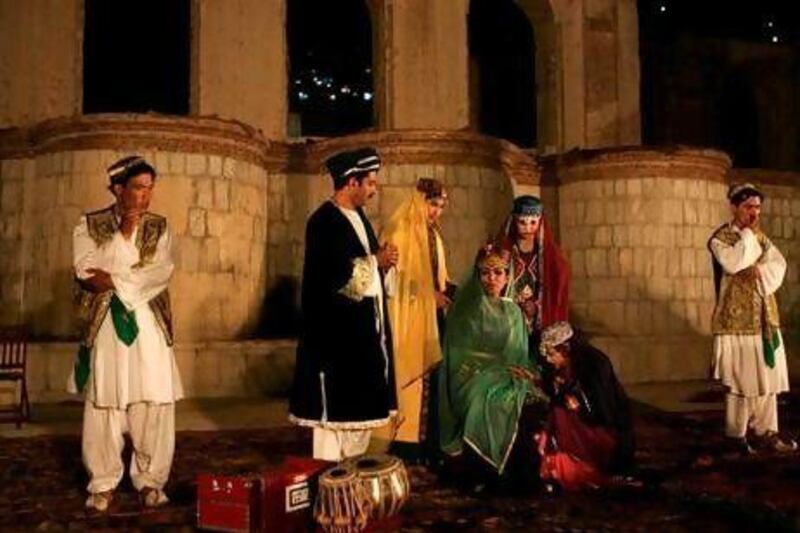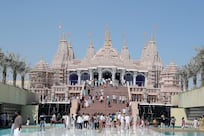Ever imagined what Shakespeare's plays might sound like in Gujarati? How about Coriolanus in Japanese? Or The Merry Wives of Windsor in Swahili? Well, London's Globe Theatre is preparing to find out.
Starting this week, all 37 of Shakespeare's plays will be performed at the Globe as they have never been before, each one in a different language, as part of the London 2012 Cultural Olympiad celebrations. The Globe to Globe season will last for just six weeks and promises to be a unique, multicultural and multilingual theatrical experience. Performances will include King Lear in Belarusian, Richard II in Palestinian Arabic, The Comedy of Errors in Persian and Love's Labour's Lost to be performed entirely in British sign language. The plays will be subtitled in English but with a translation synopsis of each scene, rather than each line.
"With the Olympics coming, we wanted to do something big, crazy and ambitious," says Tom Bird, the festival director for Globe to Globe. "We wanted to do something that reflected London, and its diversity, and that's where the idea of performing in the different languages that you hear being spoken in London came about. It's a huge celebration."
Bird says he hopes Globe to Globe will inspire people to connect with Shakespeare, but also with the diverse cultures that make London what it is. "Understanding Shakespeare is partly about understanding human nature, which is why it doesn't matter what language you speak. Some people might not normally choose to see a Shakespeare play, but we're hoping that once they see it's in their parents' language, for instance, that it will make them interested," he says. "But it's also really important to us that everyone who comes to see a play gets a chance to see the way in which people all over the world perform. It doesn't matter if you don't speak Arabic or don't speak French; you'll still see an amazing performance on stage."
Within the next month, 37 different theatre companies will descend on the Globe, each bringing a small army of actresses, actors, directors, producers, musicians and behind-the-scenes assistants. It's been a massive project to organise - Bird says one of the most difficult challenges has been to ensure everyone can get their visas in time. But, practicalities aside, it's also hugely exciting, not least for the theatre companies involved.
Susannah Harris-Wilson is one of the producers for the Urdu version of The Taming of the Shrew, performed by the Pakistani theatre group Theatre Wallay. The Urdu version, which took four months to translate from Shakespeare's text, is set during basant (the kite festival) in 1970s Lahore and stars the popular television actress Nadia Jamil. The performance promises live music and dance as well as plenty of good humour to explore the play's theme of educating and marrying women.
"I want so much for the people of London to see a really fantastic production from Pakistan to negate what they normally see of the country," she says. "Pakistanis are brilliant with comedy and that's what we're bringing out of our interpretation of the play. It also explores the point that a lot of well-educated women in Pakistan simply can't find a man to match them - but we do it with wit."
Harris-Wilson says she hopes to see Pakistanis and non-Pakistanis in the audience.
"There is so much that an English-speaking audience will be able to enjoy - they might not get all the Urdu jokes, but they will get the comedy, the humour and also some of the laughable stupidity of the assumptions around arranged marriages that are a huge part of the play."
India is bringing two plays: All's Well That Ends Well, which will be performed in Gujarati by the Aparna theatre company, and Twelfth Night, performed in Hindi by The Company Theatre.
Sunil Sanbag, who is directing All's Well That Ends Well, says he can't wait to bring the play to the Globe, because of the historical connection to the Bard it symbolises (the original Globe Theatre was built in 1599 but burnt down in 1613; the present-day Globe, a reconstruction of the original, opened in 1997). "English literature is very much alive in India, and Shakespeare is a big part of our education, so it is familiar territory and I've always enjoyed his plays. I visited the Globe a few years ago, and walked around the place as a tourist. I could never have imagined that one day I would be performing here. It's an incredible feeling."
Sanbag's interpretation of All's Well That Ends Well opens in a provincial Gujarat village in the 1900s, as opposed to in Rousillon in the south of France as Shakespeare's text does. Whereas Shakespeare's lead character, Bertram, flees to Florence to escape his new wife, Sanbag's runs away to Burma. "We decided to set our version of the play among Gujarati traders because it's known for its trading community. The backdrop is colourful and overall, we just want it to be an entertaining interpretation of a great Shakespeare comedy. We've even managed to get 16 songs in there."
The Company Theatre's artistic director, Atul Kumar, says the group is working on various interpretations of Twelfth Night, and their performance will include Hindi songs inspired by various folk traditions.
"We want to make our performance as visual as possible so that language isn't any sort of barrier," says Kumar. "Even though it is in Hindi, it's definitely not just for an Indian audience - we want our play to work for, and entertain, everyone. After all, everyone can enjoy a Shakespearean play, whatever language it may be in."
• Globe to Globe started on Saturday and will continue for six weeks. For more information, visit globetoglobe.shakespearesglobe.com/
Follow
Arts & Life on Twitter
to keep up with all the latest news and events
[ @LifeNationalUAE ]





